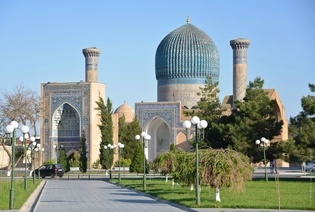Samarkand, one of the oldest inhabited cities in Central Asia, which prospered from its location on the Silk Road trade route between China and the Mediterranean, has become the first city in Uzbekistan to boost its urban sustainability planning by joining the European Bank for Reconstruction and Development’s €3-billion flagship programme, EBRD Green Cities.
This will contribute to Uzbekistan’s goal of reaching carbon neutrality by 2050.
Samarkand becomes the programme’s 48th member overall, formalised through the signing of a Memorandum of Understanding on Monday during the visit of the EBRD First Vice-President, Jürgen Rigterink. Mr Rigterink is leading a delegation of senior management to Uzbekistan from 7 to 9 June 2021.
On joining the sustainability programme, cities undertake a trigger project with EBRD finance – in Samarkand’s case this is expected to be an investment in electric buses – and also draft a Green City Action Plan (GCAP), setting out further actions to improve the local environment. Samarkand will now embark on developing a tailor-made GCAP to effectively address its environmental challenges.
To date, the EBRD has invested more than €2.4 billion through 97 projects in the economy of Uzbekistan. In 2020, the EBRD responded to the challenges of the Covid-19 pandemic in Uzbekistan by committing US$ 521 million (€429 million equivalent) through 18 projects in various sectors of the national economy. The EBRD funds were used to support the country’s banking sector and private small firms’ access to finance, upgrade key infrastructure and promote the development of renewable energy.
Globally, cities account for three-quarters of greenhouse gas emissions and represent a prime opportunity to tackle climate change. EBRD Green Cities, set up in 2016, helps each member city tailor solutions to its environmental needs with a unique combination of measures designed to move towards a lower-carbon and more liveable future.












